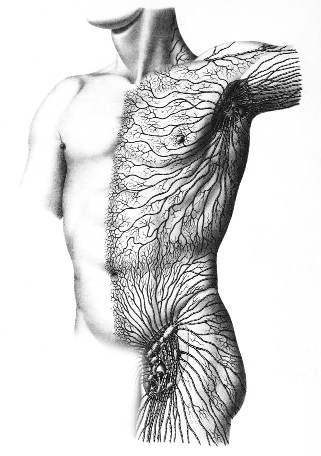The Importance of Lymph Drainage for Good Health
The proper functioning of the lymphatic system is critical to our body’s ability to drain stagnant fluids, detoxify, regenerate tissues, filter out toxins and foreign substances, and maintain a healthy immune system (Asdonk, 1970, Adair & Guyton, 1982). It is a complex system comprised primarily of lymph vessels and nodes working in cooperation to accomplish these tasks.
Unlike, the circulatory system, which uses the pumping of the heart to circulate its blood flow, lymph vessels rely upon hundreds of tiny muscular units contracting throughout the body to propel lymph flow. These contractions enable the lymph vessels to transport numerous substances (i.e., proteins, toxins, hormones, fatty acids, immune cells) to lymph nodes, which can process them. The action of these muscular units can be hindered or stopped, however, due to surgery, trauma, burns, infections, substantial swelling, fatigue, stress or age. When lymph circulation stagnates, fluids, proteins, cells and toxins accumulate, and cellular functioning is significantly compromised, This may open the way to many physical ailments and hasten the aging process.
Lymph drainage is a hands-on technique designed to attain and sustain proper functioning of the human fluid system.
How Lymph Drainage is Performed
The Lymph Drainage Therapy process involves the use of gentle manual maneuvers to aid in the recirculation of body fluids. While the exact amount of pressure applied depends on the area and pathology involved, it usually equates to very little pressure.
Using this technique, a trained therapist is able to detect the specific rhythm, direction, depth and quality of the lymph flow anywhere in the body. From there they can use their hands to perform Manual Lymphatic Mapping of he vessels to assess the overall direction of lymphatic circulation, area of stagnation, and the best alternate pathways for draining lymph and other body fluids.
The Benefits of Lymph Drainage
Lymph Drainage Therapy can prove beneficial in the correction of numerous conditions as well as in preventive health maintenance. In essence, Lymph Drainage Therapy works to help recirculating body fluids, stimulate functioning of the immune system, and balance the autonomic nervous system. It is shown that when these actions are accomplished, the results may be:
- Reduction of edemas (swelling) and Lymph edemas of many origins
- Relief of chronic and subacute inflammation and conditions such as acne, eczema and allergies
- Immune system stimulation for preventive and therapeutic effects.
- Regeneration of tissues (e.g., from burns and pre and post-surgical scaring) and anti-aging effects
- Detoxification of the body
- Relief of chronic pain
- Deep relaxation t aid insomnia, depression, stress, loss of vitality, and loss of memory
- Anti spastic actions to relieve conditions such as voluntary or involuntary muscle hypertonus
- Reduction in the symptoms of chronic fatigue syndrome and fibromyalgia
- Alleviation of adipose and cellulite tissue

At this cross section of lymph vessels shows the body’s lymphatic system is very extensive and complex. It helps circulate fluids, proteins and immune cells throughout the body, plus eliminate toxins and waste products. (Silent Waves - Dr. Bruno Chikly)
